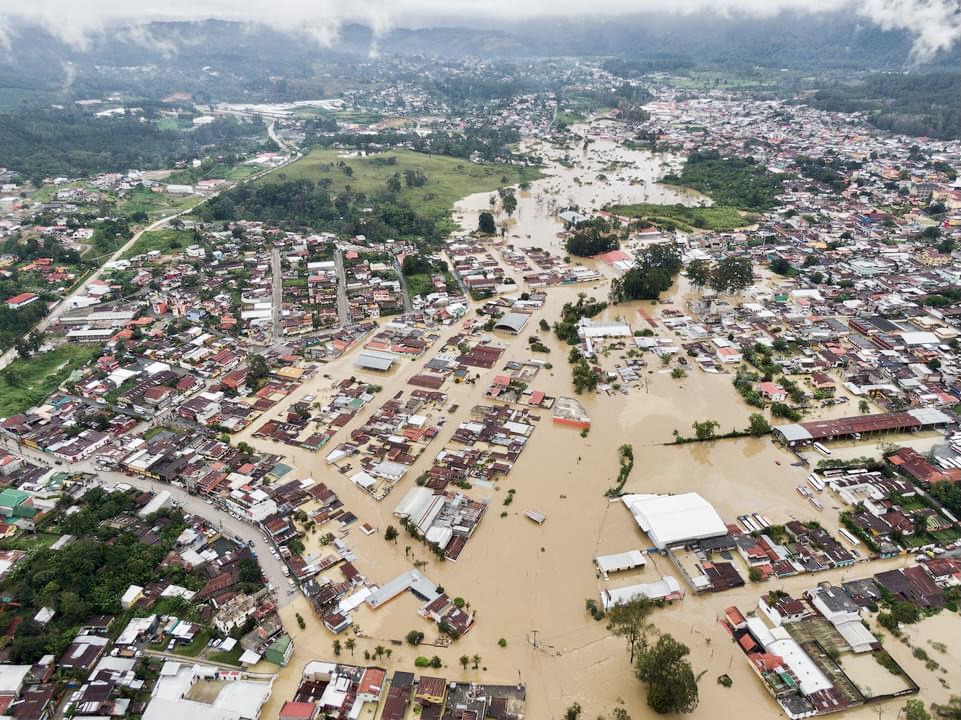Thousands of families already grappling with extreme poverty and Covid-19 have been forced to abandon their homes and livelihoods as torrential rainfall from hurricane Eta burst riverbanks and sheared mountainsides in northern Guatemala late last week. For many who escaped with their lives, it will mean starting over again.
The devastating storm struck Nicaragua with 150mph winds as a Category 4 hurricane this past Tuesday, then slowed as it moved inland over Honduras, peeling metal sheet roofing from homes while drenching Guatemala in heavy rain. Across the region, catastrophic floods and landslides have left hundreds dead and at least 300,000 people displaced in the wake of one of the fiercest storms to strike Central America in decades.
With roads and bridges washed out or destroyed by mudslides, people living in rural communities are more vulnerable and difficult to reach. It may take weeks to fully understand the extent of the damage as rescuers, community members, and aid workers conduct searches and survey on foot. After days without road access, power and water supplies, or a robust federal emergency aid response, the efforts of local municipalities and organizations who are already working in affected communities will be critical to recovery.
In several villages in hard-hit departments (jurisdictions similar to US states) of Alta Verapaz and El Quiche, Trickle Up is mobilizing local teams and coordinating with partner organizations to assess the impact of the storm on affected communities and identify families in need of aid, according to Americas Regional Director, Jorge Coy. Trickle Up currently works with about 1,600 people in the area.
“We have been visiting shelters to understand what people need and trying to contact our program participants and people from the communities” said Coy. “We are working with the local municipalities and other organizations to make sure emergency aid is reaching the most vulnerable people,” he said. The most urgent need? “Potable water.” Medicines are also in short supply.
Beyond meeting their most urgent needs, people living in deep poverty face multiple barriers to a long-term recovery. The Covid-19 pandemic has ravaged local economies in Guatemala, making it even harder for people to break free from poverty. Many of those whose homes and livelihoods were washed away this weekend will require more investment and time to start back up.
Coy sees hope in the efforts of local communities to support their members, and building community is a core part of Trickle Up’s economic development program. “We help women organize into groups and pool savings from their businesses to lend out or invest in community improvements,” he says. They have even taken on the role of informal community banks in areas where financial services are scarce or inaccessible. “The groups that women have formed in our program have lasted through the pandemic and may be one way to help finance a local recovery.”
Because people in extreme poverty are more vulnerable than most to crises like conflict, natural disasters, and health emergencies, the program focuses on building people’s economic resilience. That often means learning to run a variety of profitable businesses and growing food at home to become more self-sufficient. Cultivating small farms and growing backyard gardens have proven resilient ways for people in extreme poverty to make ends meet during the pandemic, for example.
While it’s too soon to tell how participants in the program or community members have fared through the storm, rebuilding those livelihoods and gardens will be key to moving forward. Savings groups may play a crucial role in that. And, as the volume and intensity of natural disasters increases in step with our rapidly changing climate, organizations like Trickle Up are also adapting to ensure our most vulnerable people have the tools they need to weather future crises and break free from extreme poverty.
Give now to help Trickle Up participants and communities recover from Hurricane Eta.



